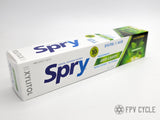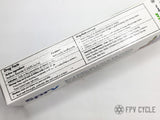This toothpaste is what I (Bob) personally use and recommend to all my patients and everyone out there. It is the very best toothpaste I've come across and I strongly recommend it. It's not going to make a huge difference to your dental health in the short term but over years of proper use, it will make a significant difference.
Disclaimer:
The following comes from having been through an arduous dental education, a decade of treating patients, heaps of research paper reviews and plain common sense. If you have other ideas about any of this, I'm interested to hear it. It is up to you if you want to believe or agree with any of the following. Do your own research.
Reasons why this toothpaste is as good as it gets today:
- Fluoride is included
This will be discussed below because it will take a bit of text but know that Fluoride is one of the most important ingredients for any toothpaste.
- Xylitol is included
Xylitol is a naturally occurring sugar that has been found to be bactericidal which means it actively kills bacteria. It has been shown across many research studies to be very healthy for oral and upper respiratory health.
- Fine grit dentifrice
Dentifrice is sand/silica. It exists in toothpaste merely as an abrasive to help scrub off plaque and calculus. Teeth and gums are very fragile despite the insane forces they undertake when chewing. Many 'whitening' toothpastes contain highly abrasive dentifrice because it actually sands off a layer of your tooth structure and destroy your gums which can make teeth look a tiny bit whiter at the expense of their demise. Nothing like this will happen in one or two brushings but over months and years, it can demolish your teeth, gums and bone architecture depending on your brushing habits. You don't want the abrasive to be too harsh but you also cannot have zero abrasive because it makes brushing properly more difficult. A fine grit with low abrasiveness is the solution and very few common toothpastes you'll find have a fine grit.
- It does NOT have the following: triclosan, sodium lauryl sulfate (SLS), parabens
This is a big one. Triclosan is an antibiotic preservative that is used in products to prevent contamination but it interferes with the body's thyroid hormone which can cause very bad things. Sodium lauryl sulfate is a chemical added to nearly all shampoos, toothpastes and anything that 'froths'. It's a chemical that makes the user feel like the product is frothing up and doing it's job. In reality, it irritates skin, eyes and lungs and can cause very severe hyperreactive episodes if you become sensitized to it. Last but not least, parabens are preservatives that interfere with hormone production in your body which is also very bad.
- Cranberry extract
The TL/DR of this is that it prevents the adhesion of bacteria to oral tissues. It's a minor thing but effective at doing it's job
Now lets talk about Fluoride:
Fluoride is a naturally occurring mineral which has several benefits to humans when used appropriately. I'll summarize a few benefits. Fluoride kills bacteria on it's own. It also gets incorporated into tooth structure that makes it much stronger and harder to dissolve by bacteria. When bacteria do manage to dissolve it, the Fluoride is released and kills bacteria. Having a very low amount of fluoride in the body will also get incorporated into bones which makes them stronger and has shown to reduce the incidence of hip fracture in the elderly among others. There are some other benefits as well but I'd like to also point out that fluoride is found in all natural water sources at some concentration, a wide variety of rocks and lots of plants which means tea is a good source of fluoride. Now on to the rest of the discussion.
There is much debate over the use of fluoride in society but I haven't seen any convincing research which shows any fluoride toothpaste to harm the human biology when used correctly. For issues to arise, an adult would need to ingest (swallow into your stomach and intestines) at least 2-3 entire tubes (depending on your weight) of any over the counter toothpaste daily for days to weeks in a row in order to begin having any issues. Under normal use, toothpaste is not swallowed and an adult spits out more than 99% of it during normal brushing.
The fluoride free 'movement' and marketing is entirely nonsense that is merely corporate America taking advantage of the misinformation which has lead to many people choosing to avoid Fluoride....which is impossible because it's all around us. On this same note, I would like to point out that Fluoride is considered poisonous in high concentrations but so is alcohol, many foods and even water if you have too much of it. To be abundantly clear, Wikipedia, a pretty decent source of information, says that a ~150lb person would need to consume 5-10 grams of Fluoride for it to be lethal. One entire tube of toothpaste contains 0.343 grams of Fluoride. This means that you need to swallow 14-29 tubes of toothpaste all at once to die.
This was a short and fragmented summary of just a few ideas around fluoride. Ultimately it's up to you but having been through my set of experiences and having treated many many of thousands of patients across a decade, I'm completely convinced that the use and deployment of fluoride in society is probably the single most effective measure against dental disease that can be done. To reject fluoride is simply just making your life more difficult and that just doesn't make sense to me.
Ingredients:
Active: Sodium fluoride
Water (Aqua), Glycerin, Silica, Xylitol, Erythritol, Lauryl Glucoside, Sodium Methyl Cocoyl Taurate, Zinc Citrate, Vaccinium Macrocarpon (Cranberry) Fruit Extract, Aloe Barbadensis Leaf Juice, Xanthan Gum, Cellulose Gum, Stevia Rebaudiana Leaf/Stem Powder, Flavor (Natural Spearmint), Sodium Benzoate, Titanium Dioxide
Instructions:
Adults and children 2 years and older: Brush teeth thoroughly, at least twice a day for two minutes each time. Ideally do not brush within 30 minutes after eating any food but you can brush before eating. Instruct children under 6 years of age in good brushing and rinsing habits (to minimize swallowing). Supervise children as necessary until capable of using without supervision. Children under 2 years of age: consult a dentist or doctor.




